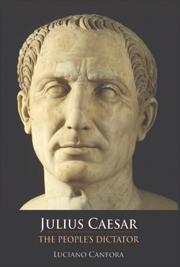Book contents
- Frontmatter
- Contents
- Translators' Note
- Acknowledgements
- Foreword
- PART I FROM SULLA TO CATILINE
- PART II FROM THE TRIUMVIRATE TO THE CONQUEST OF GAUL
- PART III THE LONG CIVIL WAR
- PART IV FROM THE CONSPIRACY TO THE TRIUMPH OF CAESARISM
- 29 Inklings of Conspiracy
- 30 ‘Iure caesus’
- 31 The Lupercalia Drama
- 32 The Dictatorship
- 33 Epicureans in Revolt?
- 34 The Hetairia of Cassius and the Recruitment of Brutus
- 35 A Conspirator's Realism: Cassius Settles for the Second Rank
- 36 Some Unexpected Refusals
- 37 Cicero – an Organiser of the Conspiracy?
- 38 The Serious Mistake of Dismissing the Escort
- 39 The Dynamics of the ‘Tyrannicide’
- 40 ‘Where's Antony?’
- 41 Caesar's Body: How to Turn Victory into Defeat
- 42 The Wind
- Chronology
- Bibliography
- Index
30 - ‘Iure caesus’
from PART IV - FROM THE CONSPIRACY TO THE TRIUMPH OF CAESARISM
Published online by Cambridge University Press: 05 August 2013
- Frontmatter
- Contents
- Translators' Note
- Acknowledgements
- Foreword
- PART I FROM SULLA TO CATILINE
- PART II FROM THE TRIUMVIRATE TO THE CONQUEST OF GAUL
- PART III THE LONG CIVIL WAR
- PART IV FROM THE CONSPIRACY TO THE TRIUMPH OF CAESARISM
- 29 Inklings of Conspiracy
- 30 ‘Iure caesus’
- 31 The Lupercalia Drama
- 32 The Dictatorship
- 33 Epicureans in Revolt?
- 34 The Hetairia of Cassius and the Recruitment of Brutus
- 35 A Conspirator's Realism: Cassius Settles for the Second Rank
- 36 Some Unexpected Refusals
- 37 Cicero – an Organiser of the Conspiracy?
- 38 The Serious Mistake of Dismissing the Escort
- 39 The Dynamics of the ‘Tyrannicide’
- 40 ‘Where's Antony?’
- 41 Caesar's Body: How to Turn Victory into Defeat
- 42 The Wind
- Chronology
- Bibliography
- Index
Summary
After the hard-fought battle of Munda, the subjugation of Hispania Baetica (Further Spain) kept Caesar busy for several months. He admitted that this time he had fought not for victory but for his life, and then had to confront determined resistance with no prospect of real pacification. The survivors from the defeated army had barricaded themselves in Corduba (Cordoba) and in the city of Munda; ‘cleansing’ those cities of these stubborn fighters, who were ready for anything, entailed considerable losses of men and months of military and political effort. In managing the victory Caesar abstained from his usual clementia, and the victors and their allies vented all their bitterness on the two cities. Land and money were needed. Not even the temple of Heracles at Gades (Cadiz) was spared. Until August, that is, for another five months after the victory at Munda, Caesar had much to do in Spain. Late in September he was at the gates of Rome, but did not enter: he was preparing the triumph, which was celebrated, to widespread bewilderment, at the beginning of October.
To celebrate a triumph over Roman citizens was an unheard-of act.
This was the last war that Caesar waged; and the triumph that was celebrated for it vexed the Romans as nothing else had done. For it commemorated no victory over foreigners or barbarian kings, but the utter annihilation of the sons and the family of the mightiest of the Romans, who had fallen upon misfortune; and it was not meet for Caesar to celebrate a triumph for the calamities of his country.
- Type
- Chapter
- Information
- Julius CaesarThe People's Dictator, pp. 269 - 280Publisher: Edinburgh University PressPrint publication year: 2007

